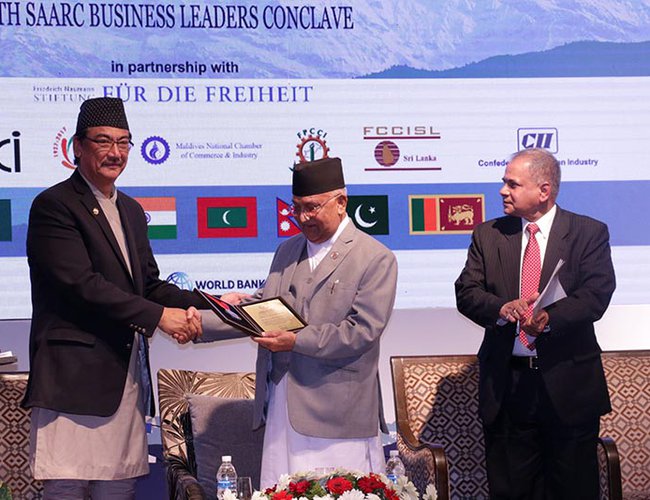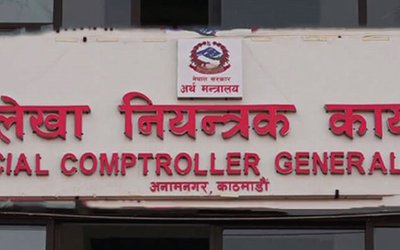
Even as there is uncertainty over the SAARC Summit, business leaders and political leaders have come together to discuss the business and trade issues of the region. SAARC Business Conclave 2018 keeps the hope of revival of SAARC Summit in future.
Despite so many disputes and uncertainties over SAARC, political and business leaders came to Kathmandu and stressed the need for integration among the South Asian countries.
They held the view that connectivity is a key to attract foreign direct investment from within the region and also from the rest of the world.
Speaking at various sessions during the 6th SAARC Business Leaders’ Conclave, business leaders said that strengthening connectivity and trade in South Asia is a pre-requisite to achieve the objective of shared economic prosperity in the region.
“There is a need for deeper integration among South Asian countries to steer the region toward the path of economic prosperity. The new era for economic development has begun in Nepal,” said Prime Minister K P Oli speaking at the inaugural ceremony of the 6th SAARC Business Leaders. “South Asia has a potential to become a prosperous region due to its immense resources.We have to work together to realize this potential.”
With a strong leadership of Suraj Vaidya, President the SAARC Chamber of Commerce and Industry (SAARC-CCI) , Nepal has been able to host the Conclave.
“Last few years have not been good for globalization and regional integration. Many countries and governments have become inward looking. Protectionism as a state policy seems to be getting strength. In our own region, conflict and turbulence seem to be persisting,” Vaidya said. “We have to overcome obstacles and work toward improving connectivity, and the only way to move forward is through public private partnership,” he added.
The three-day conclave discussed the means of common prosperity between SAARC nations, promotion of trade and investment within SAARC nations, economic and political setbacks, and the SAARC’s role in global economy along with the development and distribution of energy in the region, according to the organizers.
“Without a strong connectivity, we cannot move toward the direction of economic development in the region,” said Pushpa Kamal Dahal, Nepal’s former Prime Minister. “Political parties in the region should now take the command for economic prosperity,” added Dahal, who is also the chairperson of CPN (Maoist-Center), a member of the current coalition government.
Salman F Rahman, a private sector development adviser to the Prime Minister of Bangladesh, said that the South Asian countries should find meaningful cooperation by rising above bilateral political differences. “Sadly, domestic political issues take precedence over broader development, and inhibit the exploitation of the immense potential of the region toward rapid economic growth,” he added.
Chandra Kumar Ghimire, secretary of the Ministry of Industry, Commerce and Supplies, said that although the SAARC nations have been endeavoring for regional integration since 1980’s, they have failed to propel regional economic prosperity.
Also speaking at the sessions during the conclave, diplomats urged the governments to increase dialogues to strengthen regional cooperation in a way to contribute to the shared prosperity for all members of the region.
Alaina B. Teplitz, American ambassador to Nepal, said that regional integration is beneficial not only for South Asia, but for the entire world, including the US.
“We want to see a more stable, prosperous, and integrated South Asia; this outcome is more likely when the countries of the region are linked together through trade agreements and have greater physical infrastructure connections,” she said.
Indian ambassador to Nepal Manjeev Singh Puri said that South Asia needed to learn lessons from other parts of the world where a number of countries undergoing conflict in the past have now come together to realize economic prosperity.
“There is no meaning for pointing out at each other, but all should unite to ensure peace and security along with ending terrorism,” he said. “The region could share prosperity out of the fast growing Indian economy. As SAARC is going nowhere, the member countries are diverted towards smaller forms of integration as an alternative, such as BBIN,” he added.
The three-day conclave that was concluded discussed the means of common prosperity between SAARC nations, promotion of trade and investment within SAARC nations, economic and political setbacks, and the SAARC’s role in global economy along with the development and distribution of energy in the region, according to the organizers. Around 300 delegates from across South Asia are participating in the conclave.
- TANAHU HYDROPOWER PROEJCT: A Significant Achievement
- Apr 15, 2024
- AMBASSADOR HANAN GODAR: Sharing Pain With A Nepali Family
- Mar 30, 2024
- VISIT OF KfW AND EIB TO NEPAL : Mission Matters
- Mar 25, 2024
- NEPAL BRITAIN SOCIETY: Pratima Pande's Leadership
- Mar 24, 2024
- NEPAL ARMY DAY: Time To Recall Glory
- Mar 15, 2024
















